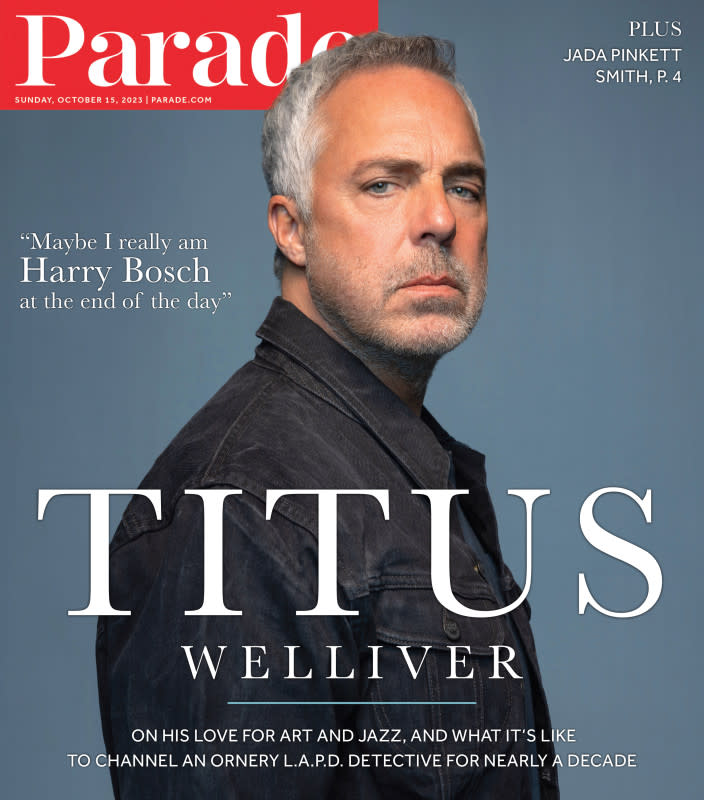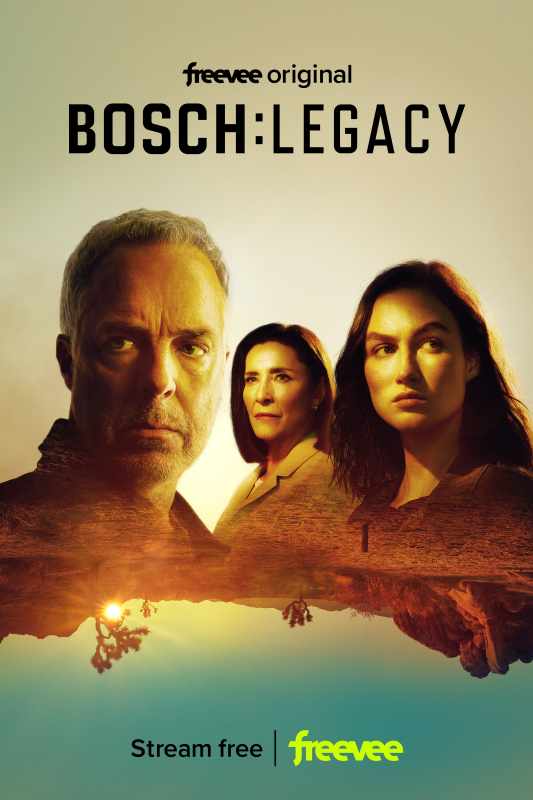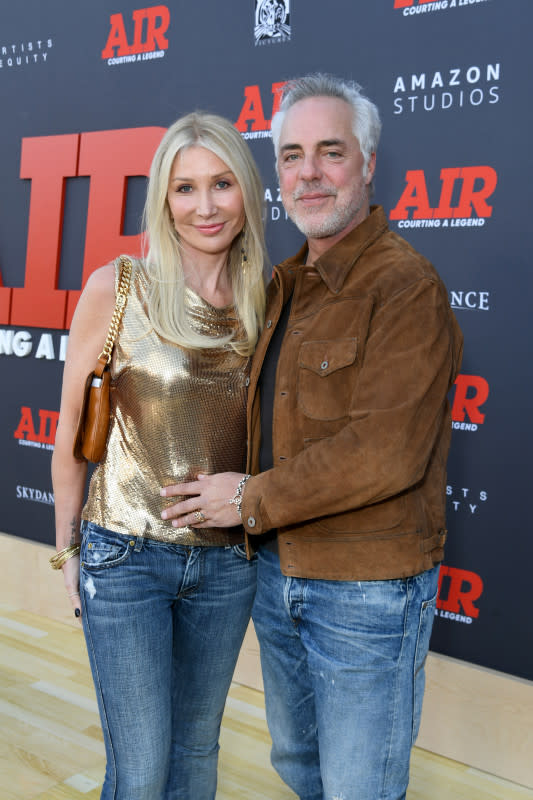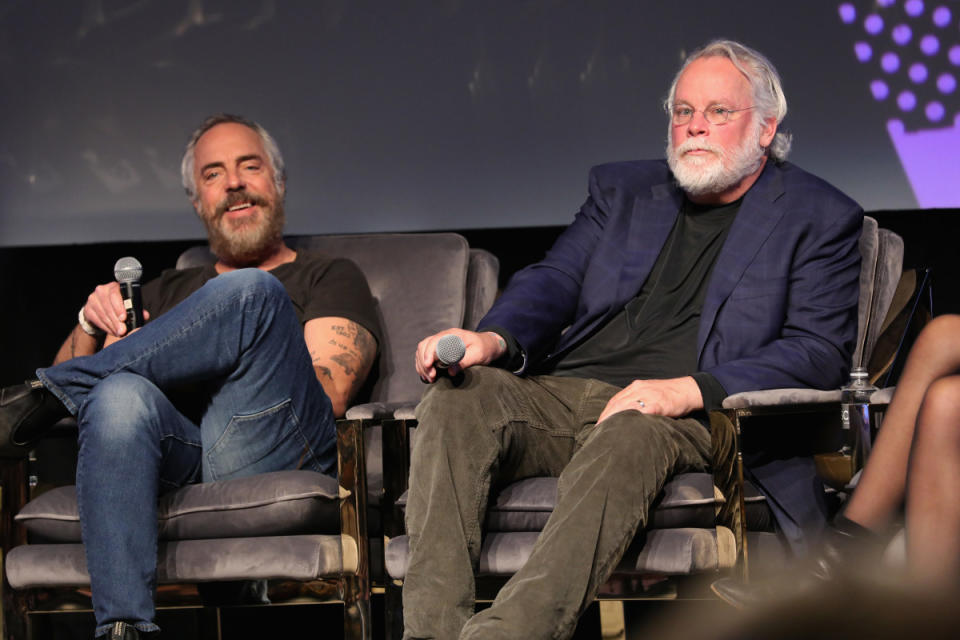Where Titus Welliver Ranks Ben Affleck as a Director

Titus Welliver Interview
No TV character could be more of an Angeleno than Harry Bosch: born and raised in the foster care system in the City of Angels; a member of the L.A.P.D. who rises to the rank of detective; a lifelong Los Angeles Dodgers fan.
But the actor who so perfectly embodies him—Titus Welliver—is actually a dyed-in-the-wool New Englander who was born in New Haven, Connecticut, attended school in New York City, Maine and Vermont, and is a Boston Red Sox fan through and through.
Welliver, going for casual in a black, V-neck T-shirt that showed off the numerous tattoos he has inked on his arms, Zoomed in from a bedroom in his Connecticut home that is lined with shelves full of books—the kind where the covers don’t match so you know they’ve been read rather than put in color-coordinated place by a decorator—to talk about the second season of Bosch: Legacy (Oct. 20 on Freevee and Prime Video) before heading out to the art studio in his barn to paint.

COVER PHOTOGRAPHY BY MATTHIAS CLAMER/AMAZON PRIME
“Both of my parents were avid readers, so I grew up that way,” Welliver says. “When I was a kid, I would read anything, including pamphlets in the dentist’s office, because I just liked to read, and that’s carried over into my adult life.”
The son of Neil Welliver, a well-known American landscape painter who was a professor of fine art at Yale University before becoming dean of the University of Pennsylvania's Graduate School of Fine Art, initially had his sights set on following in his father’s footsteps. In fact, he had studied painting with his father from ages 12 to 14, learning what he says he needed to know.
“And then I got to art school, and I was undisciplined and young, and I was more interested in having fun,” Welliver admits. After a year at Bennington College—during which he cut art classes to play Danny Zuko in a school production of Grease—he was asked, “Do you really want to be here? Because we never see you in class.”
It was a moment that gave Welliver pause, but it wasn’t until his father asked, “What do you think about when you’re not thinking about girls, beer and misbehaving?” And Welliver responded, “I think about acting.” To which his father said, “Not painting? Well, then that’s what you have to do.”
From that moment on, Welliver turned his focus to acting with no Plan B. Why acting? He got a taste of it in 1976 while spending the summer with his mother in Boston. Because there were only so many films and Red Sox games he could take in, she enrolled him at the Actors Workshop. “I audited the class and I was immediately hooked. I took to it very quickly and spent the entire summer immersed.”
Once he decided to pursue acting seriously, Welliver packed his belongings in an Army duffle bag and moved to New York City in 1980. He studied at HB Studio and New York University.
“I felt this was the time to learn how to experiment and fail because when you get out into the real world, it’s a different ball game,” Welliver says. “I saw a lot of people who were focused on other things, like getting headshots, but I became very focused and very disciplined because that’s what I was there to do.”
Welliver wasn’t an immediate success; rather his has been a long road full of twists and turns with no shortcuts, and he wouldn’t have it any other way.
“I think progression is a humble journey, as it should be,” he says. Eventually, the roles came, and starting with 1990’s Navy Seals he began to earn a living as an actor. Today, he is best known for his portrayals on the TV series Lost, Deadwood and Sons of Anarchy, and four films directed by Ben Affleck—Gone Baby Gone, The Town, Argo and Live by Night.
And then came a career-changing moment: Welliver was spotted in the TV series Touch by Michael Connelly, the author of the series of Harry Bosch novels, when he was casting for an Amazon show about the tenacious L.A.P.D. detective. Connelly realized he had found his leading man. Bosch ran for seven seasons before segueing to Bosch: Legacy, which is heading into its second season.

Freevee
“I’m very excited for it to come out because I feel not only are the first two episodes some of the best work that we’ve ever done on the show, but the season overall has a lot going on,” Welliver says. “Fans of the show have been waiting so long I feel bad for them, but what I say to them is, ‘You will be happy. It will be worth the wait.’” Read on for more of Welliver’s inside scoop on the new season.
Paulette Cohn: Bosch is a complicated man, a little broody. After 10 years, what still makes you want to play the role?
Titus Welliver: Harry’s very set in his ways. He doesn’t evolve. We’re never going to find him at a meditation retreat in Topanga or listening to new age music and trying to find his center. [But] he never gets boring, that’s the thing.
As I’ve said this to Mike Connelly, I love all the books, but I really enjoy the books when Harry is older. In the latest book, Desert Star, he’s an older man. And yet, while Harry’s trapped in an older man’s body, he’s all muscle memory. And the thing with Harry is the older he gets and the more vulnerable he might feel, the more dangerous he becomes.
The one thing that always stays true about Harry is his strong moral compass: Everybody counts, or nobody counts. Do you stack up next to that?
I do believe that. I was raised that way. And I identify with his work ethic and/or sort of obsessive nature in how he approaches what he does. I tend to do that myself in every aspect in the pursuit of making art, from acting to painting to writing. I understand that. That’s his sustenance that really keeps him going. When you take him out of the police department, he still has to do something, so being a private eye—when he gets these cases, they start out as one thing and, of course, in typical Harry Bosch land, they grow until they become very high stakes.
How does it make you feel that Michael Connelly saw you in the Touch series and saw Bosch in you?
I’d be less than truthful if I said that I wasn’t deeply touched. He’s the maestro and it’s his character. To be able to please the master, for lack of a better word, pleases me very, very much. One of the first things that Mike said was, “Is there anything that you would want to do differently? Is there anything that doesn’t feel right?” I just said to him, “Look, when it ain’t broke, there’s no need to fix it.”
Obviously, we’re having to reconfigure stuff. We’re not doing the books chronologically, and we’re finding Harry in the middle of his career rather than at the beginning. And we’re having to move it forward, change up his age, and all of these things. But I said the character, at his core, is what’s important to me. It’s to serve the character.
Related: The 23 Best Crime Movies on Netflix Right Now
You had loss at a young age: your baby sister, your brother, your stepmom. Harry also lost his mother at a young age. Does that connection help you find who he is?
I never use experiences from my actual life as a way to move myself in a performance. I found at a very early age that to do that meant that I wasn’t acting, that I was re-experiencing emotional trauma that then ceased to be acting. Doing that I felt wasn’t healthy for me.
But I do completely understand where Harry’s head is at and his prolonged processing of that loss and of that trauma. Harry is a guy who is very careful and the person closest to him [his daughter], he guards. I get that, I have children [Cora, 17, Quinn, 21, and Eamonn, 24]. I’ve never been what I would call a helicopter parent, but I do think when you experience the trauma of loss that it makes you apprehensive and it makes you extremely observant and careful. I definitely share that with Harry. I said to my wife [Samantha Edge] recently, “Maybe I’m losing my mind, maybe I really am Harry Bosch at the end of the day, maybe it's just he’s been dormant. I’m running around but I don’t have a badge and a gun.”

Getty Images
What is it like for Bosch to be retired in Legacy?
I think to a certain degree Harry is busying himself. He’s not good at being idle and sitting in that space. He’s dealing with his house [which needs repairs] and so he’s not in his eagle’s nest. He’s down in his little office and it’s isolating to a certain degree. When he’s up on his perch, that’s his safe place. Now he’s down on the ground. As we discovered in the first season, that makes him vulnerable.
Bosch is a big fan of jazz. Has that converted you?
I don’t have the encyclopedic knowledge of jazz like Mike Connelly does, but I grew up listening to all different kinds of music and a lot of jazz. My father was friends with a lot of very big jazz musicians. So, I had the privilege of getting to meet them and see them play at places like The Blue Note. So I always really loved jazz. But jazz is an integral part to who Harry is. We have a character, Mo [Stephen A. Chang], who is equally obsessed with jazz. He and Harry have some fun banter about the music. So, the music is coming back more in the forefront [on the show] as it was originally, so that pleases me. Because it really is Harry’s rhythm.
Related: Bestselling Author Michael Connelly on Taking Harry Bosch from Books to TV

Getty Images
Prior to Bosch, you’re probably best known as the Man in Black, aka the Smoke Monster from Lost. What does that show mean to you?
I was a fan [of the show] long before I was ever cast on it, it was very original. It’s really good storytelling. I think Damon [Lindelof] and company, they did a beautiful job of creating these characters. At first, they couldn’t tell me what [my character] was going to be; I had to sign on in good faith. It didn’t really dawn on me until I was shooting a scene with Néstor Carbonell [Richard Alpert] where he says, “The black smoke took my wife,” and my character says, “No, no.” He says, “How do you know this?” I had this great line where I said, “I am the black smoke.” When we were doing the rehearsal, Néstor was shaking his head. I said, “What? What?” He said, “You’re just being so calm about this.” I said, “What?” He said, “Saying I am the black smoke. That’s like saying ‘Luke, I am your father.’” Then it really dawned on me.
What was it like working with Ben Affleck, with whom you’ve done four films? Were you his good luck charm?
I had said that I was his rabbit’s foot and that he had to have me in his movies or there was going to be a problem at the box office. So I got the nickname “Rabbit’s Foot.”
I came in for Gone Baby Gone and the script was incredible. It was one of those things where I really wanted that role. But I felt like I was 10 to 15 years too young to play it. I didn’t talk myself out of it, but when I met with him, he was so effusively warm and charming and very bright that it made me want it even more. When I was cast in the role, I was thrilled.
There’s always the thing where people get very snooty about, “It’s an actor and now they’re directing their first film and blah, blah, blah.” I have to tell you that when I was on that set, and certainly when Ben showed me his first cut, I remember thinking to myself, Oh, my God, this is not the work of a first-time director. This could be their fifth movie or their 10th film or their 20th film. He’s an inordinately intelligent guy, extremely well-prepared, knows how to talk to actors, knows how to talk to cinematographers. He has the whole film in his head. He’s a very holistic guy in that way.
Also, despite the amount of work and time and patience that comes with it, it’s a tremendous amount of fun working with him. Those sets are just pure pleasure. As it should be. If it ain’t fun, no point in doing it. Yeah, working with Ben, those experiences, I think, pound-for-pound honestly, he’s probably the best director, certainly in the feature arena, that I’ve ever worked with.
Now that you have had success as an actor, you’ve picked up the paintbrush again.
When we get off of the Zoom, I’m going right up to my studio. I’m in Connecticut right now at my home here and I have a studio in a barn. I’m painting and I’ve been showing my work for years. It’s all kind of come full circle.
Next, The 10 Best TV Crime Dramas That Were Adapted From Books
